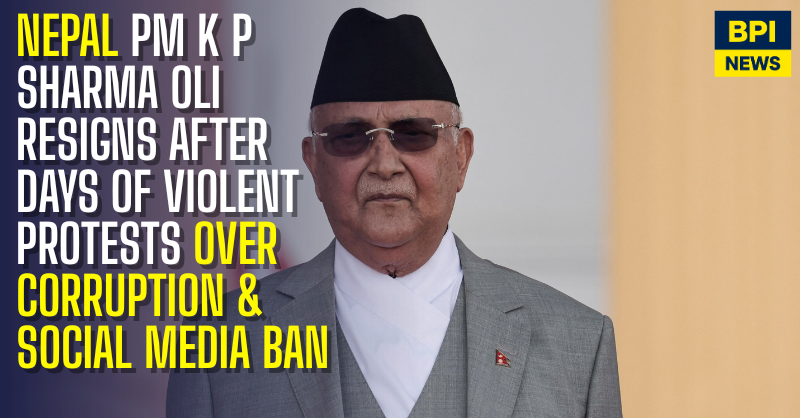Nepal’s Prime Minister K P Sharma Oli has stepped down following days of violent protests that have shaken the capital Kathmandu and spread across the country. In a statement released by his secretariat, Oli said he was resigning “to pave a way for the constitutional solution of the current crisis.”
The resignation comes amid nationwide demonstrations that escalated after the government attempted to ban 26 social media platforms, including Facebook and YouTube. Although the ban was quickly repealed, anger had already been fuelled by weeks of online campaigning under the “nepo kids” movement, which highlighted corruption, allegations of nepotism, and the lavish lifestyles of politicians’ children.
Protests intensified on Tuesday with demonstrators attacking and vandalising the residences of senior political leaders, including Oli’s own home and that of former Prime Minister Sher Bahadur Deuba. Political party headquarters were also targeted. Smoke could be seen rising above Kathmandu as crowds set fire to several major buildings.
Mohan Regmi, executive director of Civil Service Hospital, confirmed that two people were killed in the clashes and that 90 others were being treated for injuries. Motorbikes carrying the wounded were seen racing through the streets to hospitals as police fired tear gas and rubber bullets to disperse crowds.
Nepal has one of the highest rates of social media use per capita in South Asia, with over 14 million active users, almost half the population. Much of the anger has been led by younger generations frustrated by high unemployment, with 20.8% of people aged 15–24 out of work according to World Bank figures. More than a third of the nation’s GDP comes from remittances sent home by workers abroad, underscoring limited opportunities domestically.
The government said social media restrictions were aimed at tackling fake news and online fraud, but critics accused leaders of attempting to silence dissent. Protesters said their focus was corruption and inequality, demanding accountability from political elites. “We want our country back — we came to stop corruption,” one young demonstrator told the BBC.
The crisis has now forced Oli from office, plunging Nepal into political uncertainty. Opposition leaders have called for immediate reforms, while some are pushing for fresh elections. The protests mark one of the gravest challenges to the country’s stability since the adoption of its 2015 constitution.


